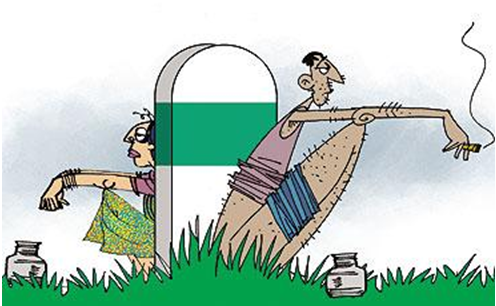In India You Can Piss But Not Kiss in Public: Part Two

India’s defecation habits continue to raise a stink with over 600 million Indians relieving themselves day in and day out in the open. India accounts for around 60 per cent of the world’s residents without toilets, according to a World Health Organization and UNICEF Report.
Half the nation’s population defecates in the open as against less than 25 per cent in Pakistan, 3 per cent in Bangladesh and 1 per cent in China, the Report adds. China has virtually eliminated open defecation as has Bangladesh. In addition, recent research reveals that open defecation leads to higher child mortality rates and stunted growth. Widespread open defecation is not merely an odd Indian exception; it is a handicap to the health and economic possibilities of the nation. The health consequences of not having access to safe toilets is particularly severe for girls and women. Research shows that early-life disease caused by open defecation reduces cognitive achievement and limits adult economic productivity. That the absence of properly functioning toilets discourages older girls from going to school is another concern.
For all these and many more reasons, any Indian political leader who takes it upon himself to end open defecation, and along with it, the scourge of manual scavenging, should be congratulated. Prime Minister Narendra Modi deserves praise for saying that building toilets is a priority over temples. Using the solemn speech in the annual commemoration of the Independence Day, he announced a new campaign to eliminate open defecation. “Has it ever pained us that our mothers and sisters have to defecate in the open?” With these words, Mr. Modi pushed sanitation up the hierarchy of national priorities. Our finance minister, Arun Jaitley, used the budget to set a goal of ending open defecation by 2019. That will be 150 years since the birth of Mahatma Gandhi, who said good sanitation was more important than independence. This is certainly not going not be an easy task. Ending open defecation requires more than simply building toilets. Regular water supply has to go with it. And families have to start cleaning the toilets themselves, instead of forcing manual scavengers to do it for them. Convincing Indian to use and clean their own toilets may prove a bigger challenge than building them. After centuries of practicing open defecation, many families may refuse to clean their own toilets because of entrenched cultural norms that associate cleaning of toilets with filth and low social status.
Nevertheless, PM Modi’s ongoing display of political commitment around sanitation is crucial in a country where more households have access to TV’s and telephones in rural India than to toilet facilities. Yet, we find that most people in India live in a district where average exposure to open defecation increased between 2001 and 2011. Ending open defecation would bring immense benefits. Some 130m households lack toilets. More than 72 per cent of rural people relieve themselves behind bushes, in fields or by roadsides. The share is barely shrinking. India spent 125.7 billion rupees on building toilets from 1999 to 2014, according to the Ministry of Drinking Water and Sanitation, and allocated 140 billion rupees on water and sanitation in the 12 months ended March 2013. That’s equivalent to 0.1 percent of GDP, less than what Pakistan, Bangladesh and Iran spent on sanitation and hygiene in 2013, according to a WHO report.
Public safety is one under-acknowledged problem as young women have to leave their rural homes after dark. Open defecation contaminates ground water, spreads disease and exposes women to sexual assaults, including two girls in Uttar Pradesh who were raped and hanged from a tree after squatting in a field near their homes. The unhealthy environments resulting from 600 million people defecating in the open have serious health impacts, which are borne significantly by children: nearly half (48%) of under-fives are stunted and over 200,000 die yearly from diarrhoea – unparalleled figures compared to countries with similar income levels. Open defecation also has broader impacts on the wellbeing of the country as a whole, affecting education, income, gender, equity and dignity.
At the same time, another concern is public health. Open defecation is disastrous as it is often practiced by groups in close contact with each other. While India’s population is enormous, growing rapidly and densely settled, it is impossible even in rural areas to keep human faeces from crops, wells, food and children’s hands. In addition, ingested bacteria and worms spread diseases, especially of the intestine. They cause enteropathy, a chronic illness that prevents the body from absorbing calories and nutrients. That helps to explain why, in spite of rising incomes and better diets, rates of child malnourishment in India do not improve faster. Unicef, estimates that nearly one-half of Indian children remain malnourished.
As far back as 1925, when India was still a British colony with a population of 280 million, Mahatma Gandhi said, "sanitation is more important than independence." While his concern did not specifically relate to public health and instead was a matter of human dignity, heeding his words perhaps would have improved—and in many cases saved—the lives of millions who were yet to be born.



